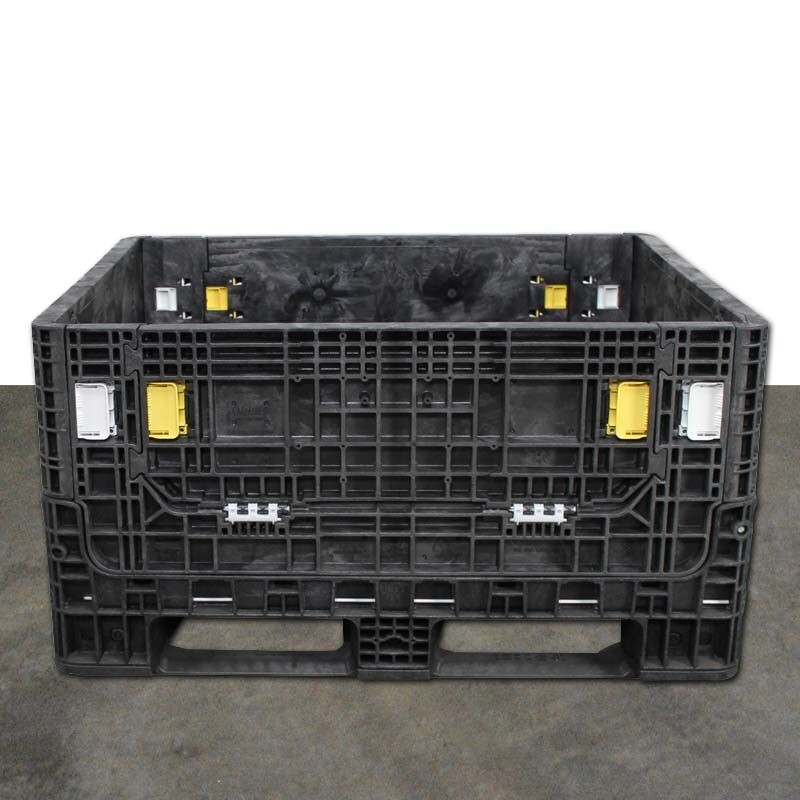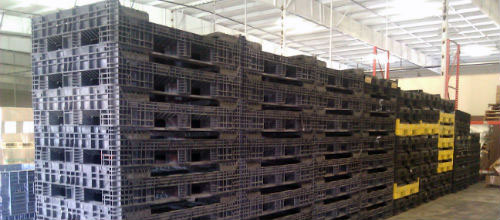The Ultimate Overview to Selecting the Right Mass Containers for Your Organization Demands
Selecting the ideal mass containers is vital for any company that relies upon effective logistics. Different kinds of containers exist, each created for certain products and applications. Aspects such as size, product compatibility, and regulatory criteria play a significant role in this decision-making process. Recognizing these aspects can lead to enhanced functional performance. Several businesses neglect crucial facets that might enhance their total performance and sustainability. What are these factors to consider?
Understanding Different Sorts Of Bulk Containers
Bulk containers act as vital tools for businesses looking for reliable storage and transport solutions. These containers come in numerous kinds, each made to meet certain functional demands. One common type is the intermediate mass container (IBC), which is optimal for fluid and granulated products, offering an equilibrium of capability and maneuverability. An additional preferred option is the mass bag, or FIBC, ideal for completely dry, flowable products. These adaptable containers are lightweight and can be quickly carried and kept. For much heavier materials, stiff bulk containers are often employed, giving longevity and security for risk-free handling. Additionally, there are specific containers tailored for harmful products, guaranteeing compliance with security laws. Understanding the distinctive attributes of these bulk container kinds permits organizations to make educated decisions that maximize logistics and minimize prices. By picking the right container, companies can enhance their functional effectiveness and simplify their supply chain processes.
Secret Product Considerations for Bulk Containers
When selecting mass containers, it is important to ponder the materials used in their building and construction. Variables such as chemical, toughness, and stamina compatibility play a crucial function in guaranteeing the containers satisfy details operational requirements. Furthermore, weight and portability problems can influence both effectiveness and transportation logistics.
Product Resilience and Stamina
Sturdiness and strength are crucial consider picking materials for mass containers, as they directly influence the container's ability to endure different environmental conditions and managing processes. Products such as high-density polyethylene (HDPE), polypropylene, and stainless-steel are commonly favored for their durable residential properties, using resistance to influence, abrasion, and temperature level fluctuations. The choice of product likewise influences the total lifespan of the container; more powerful materials commonly result in less frequent replacements, leading to set you back financial savings gradually. Furthermore, the weight of the material can affect shipping costs and ease of handling. Companies have to consider their details functional environments and the capacity for deterioration to ensure peak durability and stamina in their mass container option.
Chemical Compatibility Elements
Recognizing chemical compatibility is necessary for choosing bulk containers, as the materials made use of have to stand up to the details materials they will hold. Various variables affect compatibility, including the chemical nature of the components, temperature, and period of storage. For example, destructive chemicals may require containers made from stainless steel or specialized plastics that resist deterioration. Furthermore, reactive materials can produce heat or gases, demanding vented or pressure-rated containers. The option of container material, whether polyethylene, polycarbonate, or metal, ought to straighten with the chemical properties of the kept compounds to avoid breaches or leaks. Eventually, a comprehensive analysis of these compatibility aspects guarantees secure handling and storage space, securing both personnel and the setting while maintaining product honesty.
Weight and Mobility Concerns
Choosing mass containers involves not just reviewing chemical compatibility but additionally thinking about weight and mobility. Services must examine the convenience of handling and transport to maximize effectiveness. Lightweight products like high-density polyethylene (HDPE) or light weight aluminum can promote simpler movement and reduce delivery costs. Conversely, much heavier containers might provide improved resilience but can hinder mobility, specifically in environments requiring regular relocation. In addition, the layout of the container should permit convenient lifting and piling, ensuring ergonomic safety for workers. Companies should additionally take into consideration the infrastructure offered for transportation; as an example, containers compatible with forklifts or pallet jacks can streamline procedures. Eventually, the ideal balance in between weight and mobility straight influences functional effectiveness and price performance.
Sizing Your Bulk Containers for Optimum Performance
When sizing bulk containers, services need to very carefully assess the measurements needed to accommodate their specific products. Additionally, weight capacity is a critical aspect that influences performance and safety and security throughout transport and storage space. Reliable sizing not only takes full advantage of space yet additionally optimizes functional operations.
Figuring Out Container Dimensions
Choosing the ideal measurements for bulk containers is essential for making the most of performance in storage and transport. Services must analyze their particular requirements, thinking about aspects such as readily available area, the nature of the items being kept, and the approaches of transportation made use of. Precise dimensions assure that containers fit ideally in cars and storehouses, minimizing thrown away room and minimizing managing time. Criterion sizes can supply convenience, yet custom-made dimensions could be required for distinct requirements or to fit specific products. Furthermore, it is very important to evaluate piling capacities and access, as these elements influence total functional effectiveness. Inevitably, the appropriate dimensions bring about enhanced organization and structured logistics, benefiting the total performance of the company.
Weight Capability Considerations
Recognizing weight capacity is vital for services intending to optimize their bulk container effectiveness. The weight ability of a container straight influences storage abilities, transportation logistics, and overall operational prices. Picking containers with the appropriate weight limitations ensures that companies can safely store and deliver their items without risking damage or conformity problems. Overwhelming containers can result in structural failings, while underutilizing capacity outcomes in thrown away sources. When picking containers, it is crucial for companies to evaluate their product weights and consider any regulative demands. Furthermore, aspects such as the kind of product, meant use, and environmental problems ought to also influence weight capability decisions. By reviewing these aspects, companies can enhance efficiency and ensure a streamlined supply chain.
Regulatory Compliance and Safety And Security Standards

Regulatory conformity and security standards play a necessary duty in the option of mass containers for organizations. Organizations has to assure that their containers fulfill different regulations set by neighborhood, national, and global authorities. These standards frequently refer to product security, architectural honesty, and proper labeling, which help prevent crashes and assure the secure transportation of goods.
Furthermore, adherence to industry-specific guidelines, such as those from the Fda (FDA) or the Occupational Safety And Security and Wellness Administration (OSHA), is crucial for companies handling harmful products or food products. Non-compliance can result in penalties, legal problems, or damages to a service's track record.
Businesses ought to additionally consider the container's compatibility with the materials being stored or transferred to stay clear of contamination or chemical reactions (used collapsible bulk containers). To summarize, comprehending and executing regulatory conformity and safety and security standards is essential for the responsible and effective use mass containers
Sustainability Choices for Eco-Friendly Mass Containers

Business are also exploring choices made from recycled materials, which not just save resources yet likewise sustain the recycling sector. Additionally, developments in style permit lighter containers that require less power to transportation, better improving sustainability. By incorporating these green bulk container options, services can show their commitment to environmental stewardship while fulfilling consumer need for lasting methods. This change not only helps the planet but can also enhance brand track record and consumer commitment.
Cost-Effectiveness and Budgeting for Bulk Containers
While many companies concentrate on sustainability, cost-effectiveness stays a crucial variable when picking bulk containers. Organizations needs to assess the first purchase cost, along with lasting functional expenses, to ensure economic practicality. Aspects such as maintenance, sturdiness, and reusability play a significant function in establishing general expenses.
Investing in top notch containers might produce greater ahead of time expenses yet can cause financial savings through reduced replacement rates and lowered waste. Furthermore, businesses ought to think about transport expenses and storage space efficiency, as these can impact the total budget.

Often Asked Questions
Just how Do I Determine the Right Container for Hazardous Products?
To determine the appropriate container for unsafe products, one need to review compatibility with the substance, think about the container's material, look for governing compliance, and assess ability and safety and security functions to ensure appropriate handling and storage space.
Can Bulk Containers Be Customized for Certain Products?
Yes, bulk containers can be customized for specific products. used collapsible bulk containers. Numerous functions, such as dimension, material, and design, can be customized to fulfill unique needs, making certain optimal safety and efficiency for transporting and saving various products
What Is the Typical Life-span of Different Bulk Container Kind?
The ordinary life-span of bulk container types varies; plastic containers last 5-10 years, steel containers 10-20 years, and wood containers generally last 3-7 years, depending upon usage, upkeep, and environmental conditions.
Just how Should I Tidy and Maintain Mass Containers?
To cleanse and maintain bulk containers, one ought to frequently examine for damage, get rid of deposit, laundry with suitable cleaning agents, rinse completely, and guarantee correct drying out before storage space. Complying with producer standards improves durability and safety throughout use.
Exist Rental Choices for Bulk Containers Available?
Yes, many business use rental choices for bulk containers, supplying versatility for companies. These services can suit various demands, allowing companies to take care of supply successfully without the dedication of buying containers outright.
Longevity and strength are critical aspects in choosing materials for mass containers, as they straight influence the container's capacity to hold up against various environmental problems and managing procedures. Comprehending chemical compatibility is essential for choosing bulk containers, as the materials used have to stand up to the details compounds they will hold. Understanding weight capability is important for services intending to enhance their mass container efficiency. Regulative compliance and safety and security standards play a vital function in the option of mass containers for businesses. While numerous organizations focus on sustainability, cost-effectiveness stays a crucial element when picking bulk containers.